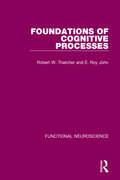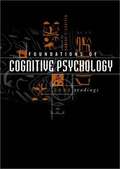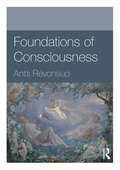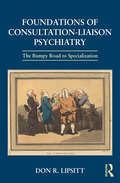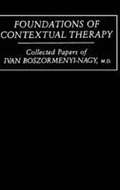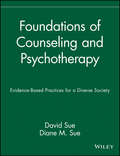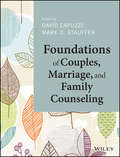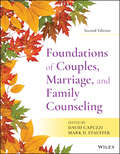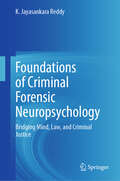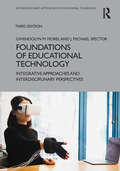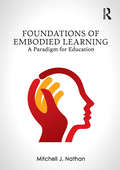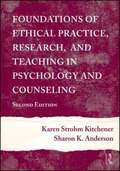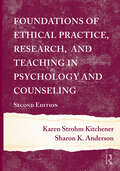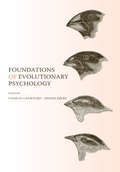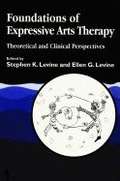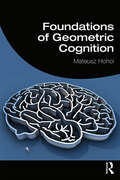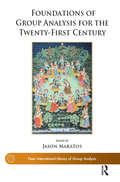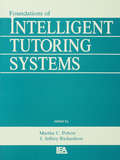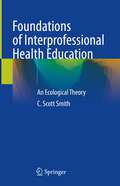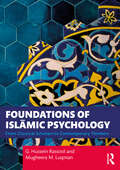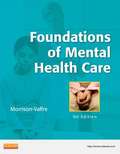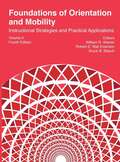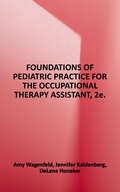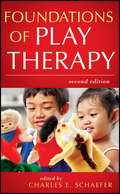- Table View
- List View
Foundations of Cognitive Processes (Functional Neuroscience)
by Robert W. Thatcher E. Roy JohnOriginally published in 1977, this title describes the basic structure and function of the brain, as well as the highest cognitive functions, using data from various disciplines to detail ways in which behaviorally relevant functions are mediated by the neural systems. Among the topics discussed are the neurophysiology of emotion, the chemical basis of memory, daily subjective experience and psychopathology, and information representation. A major purpose of this volume was to provide the student not only with a sound foundation in functional neuroscience, but also to equip them with a detailed understanding of how these facts and methods can be applied to clinical problems.
Foundations of Cognitive Psychology: Core Readings
by Daniel J. LevitinScientists from many disciplines, including physics, chemistry, biology, and neuroscience, contribute to the study of cognition. Cognitive psychology, the science of the human mind and of how people process information, is at the core of empirical investigations into the nature of mind and thought. This anthology is based on the assumption that cognitive psychology is at heart empirical philosophy. Many of the core questions about thought, language, perception, memory, and knowledge of other people's minds were for centuries the domain of philosophy. The book begins with the philosophical foundations of inquiry into the nature of mind and thought, in particular the writings of Descartes, and then covers the principal topics of cognitive psychology including memory, attention, and decision making. The book organizes a daunting amount of information, underlining the essentials, while also introducing readers to the ambiguities and controversies of research. It is arranged thematically and includes many topics not typically taught in cognition courses, including human factors and ergonomics, evolutionary psychology, music cognition, and experimental design. The contributors include Daniel Dennett, Daniel Kahneman, Jay McClelland, Donald Norman, Michael Posner, Stephen Palmer, Eleanor Rosch, John Searle, Roger Shepard, and Anne Treisman.
Foundations of Consciousness
by Antti RevonsuoThe conscious mind is life as we experience it; we see the world, feel our emotions and think our thoughts thanks to consciousness. This book provides an easy introduction to the foundations of consciousness; how can subjective consciousness be measured scientifically? What happens to the conscious mind and self when the brain gets injured? How does consciousness, our subjective self or soul, arise from the activities of the brain? Addressing the philosophical and historical roots of the problems alongside current scientific approaches to consciousness in psychology and neuroscience, Foundations of Consciousness examines key questions as well as delving deeper to look at altered and higher states of consciousness. Using student-friendly pedagogy throughout, the book discusses some of the most difficult to explain phenomena of consciousness, including dreaming, hypnosis, out-of-body experiences, and mystical experiences. Foundations of Consciousness provides an essential introduction to the scientific and philosophical approaches to consciousness for students in psychology, neuroscience, cognitive science, and philosophy. It will also appeal to those interested in the nature of the human soul, giving an insight into the motivation behind scientist’s and philosopher’s attempts to understand our place as conscious beings in the physical world.
Foundations of Consultation-Liaison Psychiatry: The Bumpy Road to Specialization
by Don R. LipsittFoundations of Consultation-Liaison Psychiatry: The Bumpy Road to Specialization documents the development of Consultation-Liaison Psychiatry from its inception to the present. The book draws on contributions from philosophy, physiology, psychoanalysis, epidemiology and other disciplines to define the broad scope of the field. Distinctions and similarities between Consultation-Liaison Psychiatry and Psychosomatic Medicine will be of interest to psychiatrists, social workers, and health psychologists, as well as students, residents, and fellows pursuing careers in these disciplines.
Foundations of Contextual Therapy: Collected Papers of Ivan Boszormenyi-Nagy
by Ivan Boszormenyi-Nagy Helm StierlinThese collected papers, covering a period of some 30 years, allow the reader to trace the developing thought of one of the world's seminal family therapists and theoreticians. In addition to providing a wealth of clinical experience, these writings reveal a characteristic familial, cultural as well as national heritage. With roots in Hungary, experiences of Hitler's Germany and Stalin's Russia, the writings reflect the unlikely survival of a small country through extreme efforts and cultural vitality. These were the ultimate sources of Ivan Boszormanyi-Nagy's lifelong concern with the disadvantaged minority, whether a disadvantaged child in a family, a disadvantaged family in a community, or a disadvantaged nation in the world community of nations. While his thoughts and writings show a clear identity with European tradition of scholarship and philosophical inquiry, there is here too a unique and dogged effort by this pioneer to develop a coherent therapeutic perspective and system that broke new ground in the area of family therapy.
Foundations of Counseling and Psychotherapy: Evidence-Based Practices for a Diverse Society
by David Sue Diane M. SueFoundations of Counseling and Psychotherapy provides an overview of the most prevalent theories of counseling within the context of a scientific model that is both practical and up-to-date. Authors David Sue and Diane Sue provide you with the best practice strategies for working effectively with your clients using an approach that recognizes and utilizes each client’s unique strengths, values, belief systems, and environment to effect positive change. Numerous case studies, self-assessment, and critical thinking examples are included.
Foundations of Couples, Marriage, and Family Counseling
by David Capuzzi Mark D. StaufferA comprehensive and practical approach to the world of marriage, couples, and family counselingEsteemed academics David Capuzzi and Mark D. Stauffer present the theory, research, and real-life practice of today's counselors and therapists in family therapy settings. Aligned with the Council for Accreditation of Counseling and Related Educational Programs (CACREP) and Commission on Accreditation for Marriage and Family Therapy Education (COAMFTE), this useful text covers foundational teaching important to readers, but also critical modern topics not included in other texts, such as sexuality, trauma, divorce, domestic violence, and addictions, filial play therapy, and using community genograms to position culture and context in family therapy.With a unique focus on practical applications, the book discusses the major family therapy theories, and provides graduate students and post-graduate learners in counseling, mental health, and behavioral health fields the skills and techniques they need to help couples and families as part of their work in a variety of helping environments. Each chapter contains case studies and anecdotes that help readers think critically about the issues they are likely to deal with as clinicians.Written by recognized and respected contributors, this book helps readers see the connection between what they know and what happens in couples and family counseling sessions. Readers will:Learn the knowledge and skills essential to family therapyUnderstand the history, concepts, and techniques associated with major theoriesExamine the key issues specific to couples work, with relevant interventionExplore solutions to the complexities generated by special issuesDiscusses the modern realities of family, diversity and culture, and systemic contextsFamily and couples counseling presents a complex interplay of various factors inherent to each individual, the dynamic interplay between each person's issues, and the outside influences that shape behavior. Foundations of Couples, Marriage, and Family Counseling helps readers sort out the complexity and guide clients toward lasting resolution.
Foundations of Couples, Marriage, and Family Counseling
by David Capuzzi Mark D. StaufferA relevant and practical approach to the world of marriage, couples, and family counseling—updated! Foundations of Couples, Marriage, and Family Counseling, Second Edition, presents the theory, research, and real-life practice that today’s student counselors and therapists need to know to work in family therapy settings. Aligned with the Council for Accreditation of Counseling and Related Educational Programs (CACREP) and Commission on Accreditation for Marriage and Family Therapy Education (COAMFTE), this useful text covers both foundational topics and modern issues not included in other texts, such as sexuality, trauma, divorce, domestic violence, addictions, filial play therapy, and using community genograms to position culture and context in family therapy. In addition to the updated content in each chapter, this Second Edition has a newly written chapter on assessment and a brand-new chapter on the topic of climate change and helping families mitigate, adapt, and transition during disruption. With a unique focus on practical applications, the book discusses the major family therapy theories and provides readers with the skills and techniques they need to help couples and families in any environment. Each chapter contains case studies and anecdotes that help readers think critically about the issues they are likely to deal with as clinicians. Master the basic knowledge and skills essential to couples and family therapy Understand the history, concepts, and techniques associated with major theories—including a new chapter on the latest assessment strategies Examine contemporary issues and interventions related to trauma, divorce, domestic violence, sexuality, climate change disruption, and more Consider the modern realities of family, diversity and culture, and systemic contexts In family and couples counseling, we must grapple with a complex interplay of individual, interpersonal, and environmental factors inherent. Foundations of Couples, Marriage, and Family Counseling helps readers sort out the complexity and guide clients toward lasting resolution.
Foundations of Criminal Forensic Neuropsychology: Bridging Mind, Law, and Criminal Justice
by K. Jayasankara ReddyThis volume, written by experts from academia, research institutions, police organizations, and private industry, tackles the most pressing challenges in the global security domain. Focusing on the protection of critical infrastructures, counterterrorism, cybercrime, and border security, this book examines how advanced ICT solutions can address emerging threats in the modern security landscape. It delves into the application of artificial intelligence, the dark web, and large-scale data analysis to combat serious and organized crime, manage disasters, and protect national security. Through a collection of case studies from over 30 large-scale research and development projects, this book provides practical insights into the operational challenges and security gaps faced by security professionals worldwide. It explores not only the theoretical aspects of global security but also identifies real-world solutions for contemporary issues such as cybercrime, border surveillance, and crisis management. The book offers a unique, multidisciplinary perspective on security policy, highlighting the complexities of securing critical infrastructures and combating global threats. By focusing on both the operational and technological aspects of security, it presents actionable insights for policy makers, security professionals, and researchers. This book is ideal for professionals and scholars in the fields of global security, cybersecurity, law enforcement, and public policy, as well as those interested in the evolving role of technology in safeguarding critical infrastructure and managing crises.
Foundations of Educational Technology: Integrative Approaches and Interdisciplinary Perspectives (Interdisciplinary Approaches to Educational Technology)
by J. Michael Spector Gwendolyn M. MorelFoundations of Educational Technology offers a fresh, interdisciplinary, problem-centered approach to educational technology, learning design, and instructional systems development. As the implementation of online, blended, hybrid, mobile, open, and adaptive learning systems rapidly expands, emerging tools such as learning analytics, artificial intelligence, mixed realities, serious games, and micro-credentialing are promising more complex and personalized learning experiences. This book provides faculty and graduate students with a conceptual, empirical, and practical basis for the effective use of these systems across contexts, integrating essential theories from the fields of human performance, learning and development, information and communications, and instructional design. Key additions to this revised and expanded third edition include coverage of the latest learning technologies, research from educational neuroscience, discussions about security and privacy, new attention to diversity, equity, and inclusion, updated activities, support materials, references, and more.
Foundations of Embodied Learning: A Paradigm for Education
by Mitchell J. NathanFoundations of Embodied Learning advances learning, instruction, and the design of educational technologies by rethinking the learner as an integrated system of mind, body, and environment. Body-based processes—direct physical, social, and environmental interactions—are constantly mediating intellectual performance, sensory stimulation, communication abilities, and other conditions of learning. This book’s coherent, evidence-based framework articulates principles of grounded and embodied learning for design and its implications for curriculum, classroom instruction, and student formative and summative assessment for scholars and graduate students of educational psychology, instructional design and technology, cognitive science, the learning sciences, and beyond.
Foundations of Ethical Practice, Research, and Teachig in Psychology and Counseling, 2nd Ed.
by Sharon K. Anderson Karen Strohm KitchenerIn Foundations of Ethical Practice, Research, and Teaching in Psychology and Counseling, Kitchener and Anderson lay a conceptual foundation for thinking well about ethical problems.<P><P> Whereas the first edition focused mainly on ethical reasoning and decision making, this new edition draws more explicitly on all components of James Rest's model of moral/ethical behavior, including moral/ethical sensitivity, moral/ethical decision making, moral/ethical motivation, and the ego strength to follow through on the decision.<P> The book addresses five key principles of ethical decision making and includes updated sections on research, teaching and supervision, and practice. It discusses the relationship of the ethical principles and the model of ethical decision-making to professional ethical codes, while offering discussion questions, case scenarios, and activities to help the reader focus on ethical character and virtue.<P> Foundations of Ethical Practice, Research, and Teaching in Psychology and Counseling gives psychologists, students, and trainees the tools they need to analyze their own ethical quandaries and take the right action.
Foundations of Ethical Practice, Research, and Teaching in Psychology and Counseling
by Sharon K. Anderson Karen Strohm KitchenerIn Foundations of Ethical Practice, Research, and Teaching in Psychology and Counseling, Kitchener and Anderson lay a conceptual foundation for thinking well about ethical problems. Whereas the first edition focused mainly on ethical reasoning and decision making, this new edition draws more explicitly on all components of James Rest's model of moral/ethical behavior, including moral/ethical sensitivity, moral/ethical decision making, moral/ethical motivation, and the ego strength to follow through on the decision. The book addresses five key principles of ethical decision making and includes updated sections on research, teaching and supervision, and practice. It discusses the relationship of the ethical principles and the model of ethical decision-making to professional ethical codes, while offering discussion questions, case scenarios, and activities to help the reader focus on ethical character and virtue. Foundations of Ethical Practice, Research, and Teaching in Psychology and Counseling gives psychologists, students, and trainees the tools they need to analyze their own ethical quandaries and take the right action.
Foundations of Evolutionary Psychology
by Charles Crawford Dennis KrebsEvolutionary psychology is concerned with the adaptive problems early humans faced in ancestral human environments, the nature of the psychological mechanisms natural selection shaped to deal with those ancient problems, and the ability of the resulting evolved psychological mechanisms to deal with the problems people face in the modern world. Evolutionary psychology is currently advancing our understanding of altruism, moral behavior, family violence, sexual aggression, warfare, aesthetics, the nature of language, and gender differences in mate choice and perception. It is helping us understand the relationships between cognitive science, developmental psychology, behavior genetics, personality, and social psychology. Foundations of Evolutionary Psychology provides an up-to-date review of the ideas, issues, and applications of contemporary evolutionary psychology. It is suitable for senior undergraduates, first year graduate students, or professionals who wish to become conversant with the major issues currently shaping the emergence of this dynamic new field. It will be interesting to psychologists, anthropologists, sociologists, economists, philosophers, cognitive scientists, and anyone interested in using new developments in the theory of evolution to gain new insights into human behavior.
Foundations of Expressive Arts Therapy: Theoretical and Clinical Perspectives
by Stephen K. Levine Ellen G. LevineThe book explores the various expressive arts therapy modalities both individually and in relationship to each other. The contributors emphasize the importance of the imagination and of aesthetic experience, arguing that these are central to psychological well-being, and challenging accepted views which place primary emphasis on the cognitive and emotional dimensions of mental health and development.
Foundations of Geometric Cognition
by Mateusz HoholThe cognitive foundations of geometry have puzzled academics for a long time, and even today are mostly unknown to many scholars, including mathematical cognition researchers. Foundations of Geometric Cognition shows that basic geometric skills are deeply hardwired in the visuospatial cognitive capacities of our brains, namely spatial navigation and object recognition. These capacities, shared with non-human animals and appearing in early stages of the human ontogeny, cannot, however, fully explain a uniquely human form of geometric cognition. In the book, Hohol argues that Euclidean geometry would not be possible without the human capacity to create and use abstract concepts, demonstrating how language and diagrams provide cognitive scaffolding for abstract geometric thinking, within a context of a Euclidean system of thought. Taking an interdisciplinary approach and drawing on research from diverse fields including psychology, cognitive science, and mathematics, this book is a must-read for cognitive psychologists and cognitive scientists of mathematics, alongside anyone interested in mathematical education or the philosophical and historical aspects of geometry.
Foundations of Group Analysis for the Twenty-First Century: Foundations (The New International Library of Group Analysis)
by Jason MaratosThe Institute of Group Analysis (IGA) celebrates forty years from its foundation with the publication of two new volumes tracing the foundations and applications of Group Analysis. The first volume ('Foundations') aims to publicise the foundations of group analysis (with the earliest papers of Foulkes) as well as the most influential theoretical contributions by pillars of modern group analysis, such as Pines, Brown, and Hopper. The reader will be able to see the development of Group Analysis, form an opinion about the trajectory that it follows, and judge which way the tradition of openness and creative integration of diverse theoretical contributions will lead in the twenty-first century. The second volume ('Applications') focuses on the numerous fields of work that use group analytic principles. Workers in the field of forensic psychotherapy would now consider it a great omission if they did not use some form of group analytic intervention, as would professionals dealing with those who manifest personality disorders, or those who work with different age groups, such as adolescents.
Foundations of Intelligent Tutoring Systems (Interacting with Computers Series)
by Elliot Soloway J. Jeffrey Richardson Martha C. PolsonThis collection of essays -- each of which treats an integral aspect of the field -- defines several key concepts and their interrelationships, outlines basic research issues, and discusses near-term applications projects. The book examines three foundations of ITSs in detail -- expert, student diagnostic, and instructional or curricular knowledge -- and describes: * How they are embodied in computer-assisted instructional environments * How these systems accrue the advantages of advanced computer interface technologies * How ITSs will emerge in the real world of complex problem solving * How researchers must learn to evaluate the effectiveness and overall quality of these dynamic systems in a world where machine tutoring may one day be taken for granted. Justine Wise Polier (1903-1987) was educated at Bryn Mawr, Radcliffe, and Barnard. She earned her law degree from Yale Law School where she was editor of the Yale Law Journal. In 1935, she was appointed Justice of the Family Court where she sat for 38 years. Judge Polier took a leave from the bench in 1941 when she was appointed special advisor to Eleanor Roosevelt at the Office of Civilian Defense in Washington. She also served as Chairman of the Committee on Mental Health for New York. Judge Polier was a founder and president of the Wiltwyck School; vice president of the Citizens Committee for Children of N.Y.; vice president of the American Jewish Congress; Delegate to the White House Conferences on Children and on Education. Judge Polier was a member of the Institute of Judicial Administration, American Bar Association. She was on the editorial board of the International Juridical Association and was awarded the 1964 Isaac Ray Award by the American Psychiatric Association for "contributions to the improvement of the relations of Law and Psychiatry." Following her retirement from the bench, she served as the director of the Juvenile Judge division of the Children's Defense Fund. During her illustrious career, Judge Polier was the recipient of numerous awards including: the Citation for Distinguished Service to the City of New York, 1973; the Human Services Award from the New York and Bronx Mental Health Association, 1973; the Eleanor Roosevelt Humanitarian Award from the Board of Directors of Wiltwyck School, 1975. Judge Polier also published numerous reports and several books including: Everyone's Children, Nobody's Child; Back to What Woodshed?; A View from the Bench; and The Rule of Law and the Role of Psychiatry.
Foundations of Interprofessional Health Education: An Ecological Theory
by C. Scott SmithThis book is designed to introduce a theory of ecological psychology into interprofessional health education. The foundations are affordances (features in the environment that afford the opportunity to be recognized and utilized), the life-world (what the meaningful environment contains for the trainee), and behavioral-settings (person-made affordances that are permissive, supportive, or resistive to specific behaviors). Expanding the life-world is the main mechanism of learning in health care. Becoming aware of intentional and unintentional features of the behavioral setting is how we structure the curricular environment to achieve this life-world expansion. The book is structured into four domains: The Natural Domain, The Mental Domain, The Social Domain, and Non-Linearity. The final application section lays out a structure for designing, implementing, and evaluating the educational program in a professional healthcare setting. This book is ideal for clinician managers of interprofessional healthcare clinics, and for the teachers and trainees from each discipline (e.g., medicine, nursing, pharmacy, psychology, social work, etc.).
Foundations of Islāmic Psychology: From Classical Scholars to Contemporary Thinkers
by G. Hussein Rassool Mugheera M. LuqmanFoundations of Islāmic Psychology: From Classical Scholars to Contemporary Thinkers examines the history of Islāmic psychology from the Islāmic Golden age through the early 21st century, giving a thorough look into Islāmic psychology’s origins, Islāmic philosophy and theology, and key developments in Islāmic psychology. In tracing psychology from its origins in early civilisations, ancient philosophy, and religions to the modern discipline of psychology, this book integrates overarching psychological principles and ideas that have shaped the global history of Islāmic psychology. It examines the legacy of psychology from an Islāmic perspective, looking at the contributions of early Islāmic classical scholars and contemporary psychologists, and to introduce how the history of Islāmic philosophy and sciences has contributed to the development of classical and modern Islāmic psychology from its founding to the present. With each chapter covering a key thinker or moment, and also covering the globalisation of psychology, the Islāmisation of knowledge, and the decolonisation of psychology, the work critically evaluates the effects of the globalisation of psychology and its lasting impact on indigenous culture. This book aims to engage and inspire students taking undergraduate and graduate courses on Islāmic psychology, to recognise the power of history in the academic studies of Islāmic psychology, to connect history to the present and the future, and to think critically. It is also ideal reading for researchers and those undertaking continuing professional development in Islāmic psychology, psychotherapy, and counselling.
Foundations of Kinesiology: Studying Human Movement and Health (Second Edition)
by Peter KlavoraFOUNDATIONS OF KINESIOLOGY (2nd ed.) is a textbook designed for senior high school and introductory college and university programs in kinesiology, physical education, and exercise science. The book explores the multifaceted world of kinesiology: the study of human movement and the body s response to exercise. It examines the systems, factors, and principles involved in human development within the context of society. Relevant fields in the study of kinesiology include anatomy, physiology, biomechanics, nutrition, motor learning and control, and sport psychology, sociology, and philosophy. The relevant career options available to students in the field are also examined.
Foundations of Mental Health Care
by Michelle Morrison-ValfreIncrease your awareness and understanding of a holistic view of mental health care with this book for nurses and other health care professionals. Each chapter covers a specific psychological or psychosocial problem as well as the most current interventions and treatments. This edition features full-color illustrations, updated drug information, and a chapter on complementary and alternative therapies, in addition to more case studies to help you apply the content to real life. This solid background in mental health is just what you need to work comfortably with clients who exhibit both effective and maladaptive behaviors.
Foundations of Orientation and Mobility: Instructional Strategies and Practical Applications Volume II
by William R Wiener Robert S Wall Emerson Bruce B BlaschNow in its fourth edition, Foundations of Orientation and Mobility remains the classic reference and textbook for O&M professionals and students alike. A comprehensive work spread across two volumes, Foundations of O&M, 4th ed., contains contributions from over 50 of the leading scholars, teachers, and practitioners in the field addressing topics such as teaching methodologies, sensorimotor functioning, working with both children and adults, and navigating complex intersections. There is also an emphasis on the many new technologies and apps available to children and adults who are blind or low vision to help them better navigate their world. Foundations of Orientation and Mobility, Volume II: Instructional Strategies and Practical Applications provides in-depth information on topics such as sensory use in O&M, teaching O&M to various age and ability groups, and the application of technology.
Foundations of Pediatric Practice for the Occupational Therapy Assistant
by Amy Wagenfeld Jennifer Kaldenberg DeLana HonakerFoundations of Pediatric Practice for the Occupational Therapy Assistant, Second Edition delivers essential information for occupational therapy assistant students and practitioners in a succinct and straightforward format. In collaboration with a wide range of highly skilled and expert professionals from clinical practice and academia, Amy Wagenfeld, Jennifer Kaldenberg, and DeLana Honaker present an interprofessional perspective on pediatric clinical foundations, theory, and practical application activities in a highly accessible and engaging format. The Second Edition of Foundations of Pediatric Practice for the Occupational Therapy Assistant offers new and engaging features, including diverse illustrations, to facilitate learning from the classroom to the clinic. Integrated within each chapter are Stories From Practice: brief vignettes of actual author clinical experiences, short case studies, and reflective activities designed to elicit discussion and exploration into the unique world of pediatric occupational therapy theory and practice. A new chapter on childhood trauma has been added to enhance the comprehensive and current nature of pediatric practice in the 21st century. Available online is a significant Major Infant Reflexes Chart and a comprehensive Normal Developmental Milestones Chart that will reinforce important concepts associated with child development as it relates to occupational therapy assistant practice. The seamless integration of this material enables all readers to develop a comprehensive understanding of the information and apply that knowledge in a pediatric setting. Features of the Second Edition: - Up-to-date information, including the AOTA's current Occupational TherapyCode of Ethics - Stories From Practice feature, which provides a unique reflective link from classroom to clinic - Useful resources for classroom to clinical practice - Bonus website that provides a comprehensive Normal Developmental Milestones Chart and Major Infants Reflexes Chart - Chapter on childhood trauma Instructors in educational settings can visit www.efacultylounge.com for additional material to be used for teaching in the classroom. Foundations of Pediatric Practice for the Occupational Therapy Assistant, Second Edition continues to be the perfect text for both occupational therapy assistant students and practitioners specializing in or transitioning to pediatrics.
Foundations of Play Therapy
by Charles E. SchaeferThe landmark guide to play therapy--completely updated and revisedEdited by Charles E. Schaefer--the "father of play therapy"--Foundations of Play Therapy, Second Edition is a complete, state-of-the-art guide to the many diverse approaches to, and methods used in, play therapy practice with children and adolescents.Featuring an expert panel of contributors, this comprehensive reference provides up-to-date and insightful coverage of all of the major theoretical models of play therapy and offers practical examples for the application of each model, including:Narrative play therapySolution-focused play therapyExperiential play therapyRelease play therapyIntegrative play therapyPsychoanalytic approaches to play therapyChild-centered play therapyGestalt play therapyFamily play therapyCognitive behavioral play therapyPrescriptive play therapyWritten for therapists looking for guidance on how to incorporate play therapy into their practice, as well as students or those in need of a refresher on the latest methods and techniques, Foundations of Play Therapy, Second Edition is a standard-setting resource presenting pragmatic and useful information for therapists at all levels of training.
